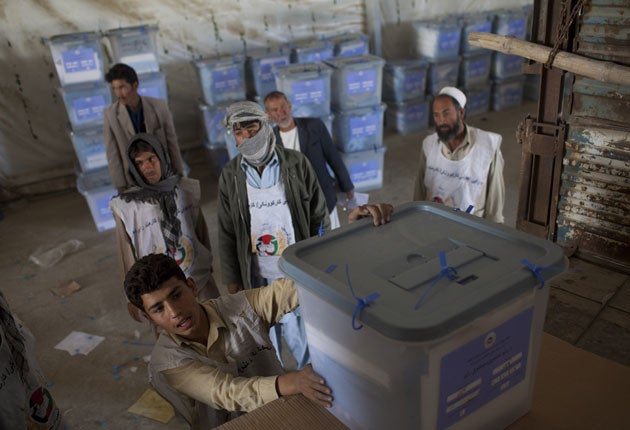Violence, fraud and cronyism keep millions away from Afghan poll

Almost as quickly as the international community rushed to praise Saturday's parliamentary elections in Afghanistan, complaints of widespread irregularities began pouring in, echoing the protracted wrangle over vote-rigging that returned President Hamid Karzai to power last year.
Representatives from the US, UN and EU hailed the bravery of Afghans for heading to the polls on Saturday despite pre-election violence and Taliban attacks on polling day that killed 18 people. However evidence was mounting yesterday of polling stations opening late, intimidation of voters, and the widespread use of fake voting cards. There were also reports that there were not enough ballot papers and that children had cast ballots.
President Hamid Karzai praised "the courage of the people" in voting, saying it was "a positive and major step for strengthening democracy in this country". Nato's secretary general, Anders Fogh Rasmussen, applauded voters for turning out "despite the violence carried out by those attempting to deny the people's most basic democratic right". But the courage of many ordinary Afghans notwithstanding, what the evidence suggests so far is that power is disbursed across Afghanistan not by universal suffrage but through coercion, bullying, bribery, cronyism, patronage and fear.
In the eastern city of Jalalabad, election monitors warned that systematic cheating had taken place. "The women coming here have so many cards that don't have the stamp and are not real cards but still they are voting," said Nazreen, a monitor for the Free and Fair Election Foundation of Afghanistan, an observer mission operating across the country.
In Wardak, just to the southwest of Kabul, the American journalist Anand Gopal reported that police had clashed with election officials they found stuffing ballot boxes after being bribed by a candidate. Conversely, in other districts some police officers actively went along with the fraud.
With more than 2,500 candidates vying for 249 seats, the margins of victory will be small and election officials are expected to take weeks sifting through complaints from unsuccessful candidates. Although the results of the vote will have no immediate impact on the Nato mission to Afghanistan, if vote-rigging approaches the levels witnessed last year, it will be a significant embarrassment for the Obama administration as it goes into mid-term Congressional elections in November.
Another sign of the political rot was the degree of nepotism among parliamentary candidates. "In an election without parties, where the ideology of the 2,500 candidates is largely unofficial or confused, it is difficult to assess who is up and who is down in Afghan politics, but one clear trend is the high number of candidates who are the relatives of those already in power," blogged the analyst Kate Clark. "Brothers of ministers, daughters of MPs and multiple relatives of heads of politico-religious networks are among the rather large number of relatives of those with clout, money or government positions standing for election." So disgusted are many Afghans with their political classes that turnout was the lowest it has been in any election since 2001.
Before voting began at 7am, the UN envoy to Afghanistan, Staffan de Mistura, had said that a turnout of between five and seven million people, out of roughly 11.4 million registered voters, would represent a triumph. Worryingly for him, police and journalists outnumbered voters at many polling centres and preliminary figures suggest that 3.6 million ballots had been cast.
That number represents a sharp drop in political engagement since the 2004 presidential election, when 7.4 million certified ballots were cast. Even in last year's fraud-riddled presidential ballot, 4.8 million ballots were deemed legitimate.
Afghan voices: 'This is an Islamic country: we don't want democracy'
Safiullah Esmarai, shopkeeper, 22: 'I didn't vote for anyone. I didn't see anyone good or honest. Afghanistan is an Islamic country. We shouldn't have a democracy anyway. Democracy means women and mixing, and bringing in foreign ideas. Good for foreigners. Bad for us.'
Agha Shirin, phonecard vendor, 45: 'I didn't vote because I lost my voting card. But I wouldn't have anyway. No one has helped us. Democracy can bring a better life but President Karzai is surrounded by useless people.'
Bibi Hahi Rahman Bibi, housewife, 58: 'I didn't cast a vote because I didn't know where to go. Even though it is important to vote, I didn't. I would have voted for anyone I thought could serve this country and I hope that the new MPs do that.'
Mohammad Jawad, butcher, 23: 'I voted for someone who could help build our country. Our political told us who would be best to represent us. We don't believe in democracy or freedom – we've had enough of it. We've spent half our lives under this system and look at it.'
Join our commenting forum
Join thought-provoking conversations, follow other Independent readers and see their replies
Comments